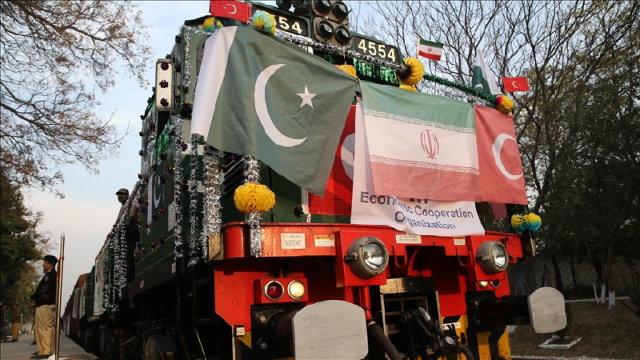Businessmen decry hurdles to trade
Say banks reluctant to issue export forms for trade with Turkey via cargo train

Businessmen have said that Pakistan-Turkey cargo train has kick-started operations in a smooth manner, however, commercial banks are creating bottlenecks in the way of issuing export forms on the pretext that the trade route involves journey through a sanctioned country, ie Iran.
In a statement on Thursday, Federation of Pakistan Chambers of Commerce and Industry (FPCCI) President Mian Nasser Hyatt Maggo said that hurdles were being created in the way of smooth land-based trade with Turkey under the TIR Convention.
He pointed out that banks were not issuing export forms, citing that trade with a sanctioned country was underway.
Maggo recalled writing a letter to Finance Minister Shaukat Tarin in December 2021 to highlight the issue but unfortunately no action was taken. “The business community is very enthusiastic about the prospects of land-based trade with Azerbaijan and Turkey, and they have pre-booked trucks and train cargoes under the TIR Convention,” he pointed out.
The FPCCI chief urged the government to form an empowered committee to look into the matter for its speedy resolution.
Union of Small and Medium Enterprises (UNISAME) President Zulfikar Thaver was of the view that the State Bank of Pakistan should ink a currency swap agreement with Turkey to tackle the issue.
“No doubt there are sanctions on Iran but local banks fail to understand that food and medicine trade is allowed as per United Nations regulations.”
Pakistan Businesses Forum (PBF) Vice President Ahmad Jawad stated that the resumption of cargo train service after 10 years was an important measure taken as part of the Economic Cooperation Organisation (ECO) framework and vision.
“The track offers the shortest and most affordable route for transportation of goods between Asia and Europe,” he said. “This development will aid Pakistan’s regional connectivity and trade with neighbouring countries.”
He detailed that the train could complete the journey between three countries (Pakistan, Iran and Turkey) in about 14 days, which was faster and less costly than the alternative sea route.
He requested the State Bank to instruct commercial banks to swiftly issue export forms for the route. He voiced fear that if commercial banks failed to cooperate, then government’s efforts would go in vain. On the other hand, the SBP has already amended its foreign exchange regulations and now exporters are required to bring export proceeds within a maximum period of 120 days from the date of shipment. Earlier, the maximum window of time was 180 days.
Arif Habib Commodities CEO Ahsan Mehanti said that commercial banks were bound to comply with the Financial Action Task Force (FATF) and central bank’s regulations before they could issue export forms for a sanctioned country.
“Iran is a sanctioned nation and Pakistan-Turkey cargo train can be utilised for bilateral trade only,” he said.
Sustainable Development Policy Institute Executive Director Dr Abid Qaiyum Suleri said that passing through Iran did not mean that Pakistan was trading with a sanctioned country.
“However, banks may have concerns over the movement of cargo through Iran because US sanctions are getting stronger day by day,” he said.
Published in The Express Tribune, January 7th, 2022.
Like Business on Facebook, follow @TribuneBiz on Twitter to stay informed and join in the conversation.





1733130350-0/Untitled-design-(76)1733130350-0-208x130.webp)











COMMENTS
Comments are moderated and generally will be posted if they are on-topic and not abusive.
For more information, please see our Comments FAQ